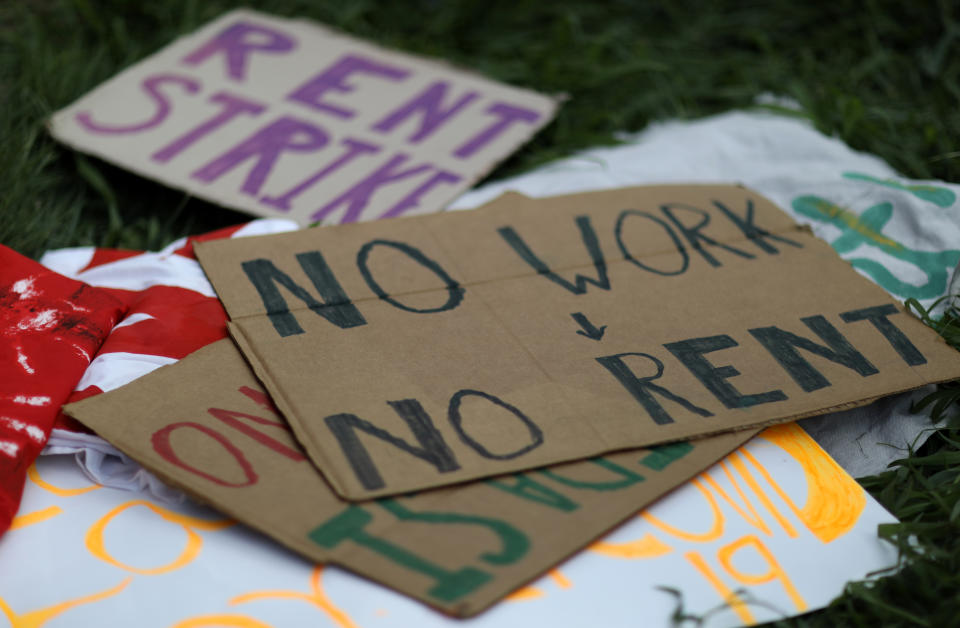Trump's order on evictions offers little protection to renters

President Trump has repeatedly claimed over the past week that an executive order he signed on Saturday will prevent an impending wave of evictions across the country, but housing experts told Yahoo News his action provides no such protection.
“We don’t want people being evicted, and the bill I’m signing will solve that problem largely, hopefully completely,” Trump said of the document, which was not actually a bill.
In response to a question at his press briefing Tuesday evening, Trump said that while evictions might not matter to Democrats, he would stop them. “We’re stopping evictions. We’re not going to let that happen. The Democrats, maybe they don’t care, but I care, and we signed an executive order — you know that, right? — and we are not letting people be evicted.”
On Wednesday he repeated the assertion, saying, “I want to make it unmistakably clear that I’m protecting people from evictions. They didn’t want to do that. The Democrats didn’t want to do a protection from evictions.”
If Trump’s statements were accurate, it would offer a lifeline to the 1 in 3 Americans who had outstanding housing payments as of Aug. 1. An analysis of the U.S. Census Household Pulse Survey by the advisory firm Stout found 17 million households at risk of eviction. However, multiple housing and eviction experts told Yahoo News the document Trump signed doesn’t actually prevent people from losing their homes. It simply gives direction to various government agencies such as the Department of Housing and Urban Development (HUD) and the Federal Housing Finance Agency (FHFA) to look into potential solutions.
“The executive order has created confusion among renters and landlords,” said Emily Benfer, chair of the American Bar Association’s Task Force Committee on Eviction and a visiting professor at Wake Forest Law School. “The executive order on eviction does not in any way create a moratorium on eviction, nor does it direct federal agencies to issue a moratorium. Any statement otherwise is false and should not be relied upon. Tenants facing eviction in states or cities without a local eviction moratorium in effect should immediately seek legal advice.”

“The moratorium asks whether eviction is harmful during a pandemic, a question that has been answered by experts and researchers repeatedly for months,” added Benfer. “The fact remains: The United States is facing a severe eviction crisis that must be prevented to both control COVID-19, to support pandemic recovery and to protect Americans from long-term harm.”
Christine Donahoe, housing priority coordinator for Legal Action of Wisconsin, concurred.
“This order instructs HUD to consider whether an eviction moratorium would help stop the spread of COVID-19,” she said. “It does not stop evictions. It asks HUD and FHFA to look into whether the agencies could provide financial assistance to certain tenants in federally assisted housing. It does not create any fund for renters. Interestingly, the preface to the order describes exactly how evictions exacerbate the spread of COVID-19 for an already vulnerable population. The president goes as far as to say, ‘My administration must do all that it can to help vulnerable populations stay in their homes in the midst of this pandemic,’ but his order does not simply extend the eviction moratorium or provide any immediate relief to renters.”
Dana Karni, a managing attorney at Lone Star Legal Aid in Houston, called Trump’s action “nominal, at best.”
“The executive order does not provide any protections whatsoever to extend prior moratoria or create new ones,” Karni told Yahoo News. “In other words, unless some landlords or eviction court judges read the president’s public statements as new black-letter law, there are no new protections to prevent evictions from continuing.”
The Coronavirus Aid, Relief, and Economic Security (CARES) Act, passed in March, provided a moratorium on evictions from federally backed rental units. Those number about 12 million units, or 28 percent of the total market, according to an Urban Institute analysis. Protection for renters ended on July 25, along with supplemental unemployment benefits. Negotiations to pass another COVID-19 relief bill — in which Democrats are seeking another moratorium and housing assistance in addition to an extension of federal unemployment benefits — have stalled, with Politico reporting Tuesday that no stimulus deal is expected soon because White House chief of staff Mark Meadows, a key negotiator, is “out for the week” and because Trump believes the weekend signings have given him the political upper hand.
Some states and cities still have moratoriums in place, but there are limits to their effectiveness, as they allow tenants to only defer rent payments, not cancel them. That keeps people housed temporarily, but if they’ve lost their job and there are no expanded government benefits, they may not be able to meet their bills when the moratorium ends and the rent is due.
The Health and Economic Recovery Omnibus Emergency Solutions (HEROES) Act, passed by House Democrats in May, would have extended moratoriums and created a housing assistance fund to aid renters and homeowners. At the end of June, the House also passed a bill sponsored by Rep. Maxine Waters, D-Calif., that would provide $100 billion to emergency rental assistance programs and create a $75 billion relief fund for homeowners. Both bills stalled in the Senate.
_____
Read more from Yahoo News:



